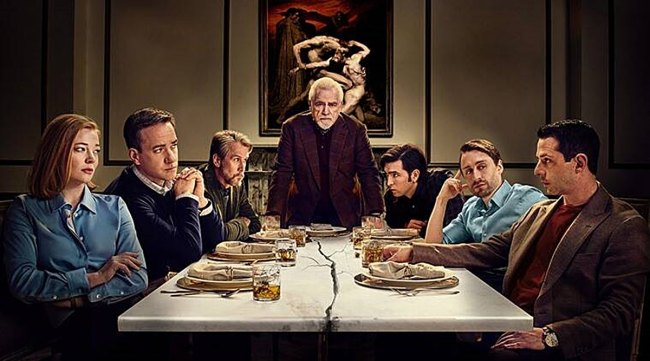Opinion Lessons from Succession: The dangers of billionaire media moguls
When a handful of companies and individuals decide what the rest of the world watches, what kind of democracy do we land up with? A fake one. And they know it
 The Succession writers’ team drew from several real-life parallels to craft its tense boardroom conversations and tyrannical media personalities. (File)
The Succession writers’ team drew from several real-life parallels to craft its tense boardroom conversations and tyrannical media personalities. (File) The world is full of Logan Roys, men in positions of power who will stop at nothing. They exploit third-world labour, overthrow foreign governments, jeopardise domestic elections, cover up appalling crimes, betray family members, and don’t look back — if they could get just a little more power, just a little more muscle, just one more gold coin to toss into the overstuffed gunny sack of riches they carry around the globe. Logan’s story in Succession, and by extension, his children’s story, was a tragedy. It was a painful four-season arc of three children desperately trying to seek the approval of their father and never succeeding. But the show was also a commentary on the media. It was a story about mergers and acquisitions, about the toxicity of Instagram and Facebook, about news being produced and consumed for free, about attention spans and eyeballs being traded on the marketplace like a commodity. It was a prophecy: If our media withers, we all wither.
In the very first season, Succession sets that up: The purchase and sale of media companies is just a game of profiteering for Logan. Honest journalism? Editorial independence? Unimportant. If Logan Roy wants to purchase a clutch of local news stations to bolster shareholder confidence, he damn well will. He will sway the ostensibly objective journalism of those channels with a flick of his finger and convert them into raving right-wing megaphones. If he wants to buy a rival media giant, Pierce Global Media, for similar motivations, he will — just because he wants to be too big for stock markets and governments to intimidate. If he wants to sell his company to a young hip streaming company, GoJo (the central conflict of seasons three and four), he will do it at the cost of his own children on the board, who he just doesn’t consider serious enough for the cutthroat business he is in.
The Succession writers’ team drew from several real-life parallels to craft its tense boardroom conversations and tyrannical media personalities. The most prominent examples are the Murdoch and Redstone media families. The former owns Fox News, The Wall Street Journal, and, according to a 2016 Forbes article, a total of 120 newspapers in five countries. The high-decibel prejudicial journalism practised by ATN, Waystar Royco’s flagship news network, has eerie similarities with news anchors on Fox News, as well as some of its more shrill Indian counterparts. Showrunner Jesse Armstrong has reportedly discussed how Time Warner’s complicated legacy (owning legendary intellectual properties like the Warner Bros movie studio, HBO, CNN and DC Comics) and being shuttled from buyer to buyer (from AOL to AT&T to Discovery) influenced Logan’s power-hungry acquisitions.
Billionaires like this fictional media tycoon control a giant chunk of our real-life media landscape. By ferociously and relentlessly devouring competitors, they control everything we see on our mobile phones or television screens or books, permanently in control of the narrative. What we think are diverse choices in our media diet — different movie studios, different news channels, different publishing companies — are simply different flavours of the same sugar-coated candy. The New Yorker, Vanity Fair and Vogue all come under the banner of Advance Publications, spearheaded by the Newhouse brothers — both billionaires. Warren Buffet (another man with modest means) owns 70 newspapers across the United States. Billionaire Michael Bloomberg owns Bloomberg LP, billionaire Carlos Slim Helu owns The New York Times, and billionaire Jeff Bezos owns The Washington Post. Disney owns Lucasfilm, Marvel, Pixar, and 21st Century Fox. When a handful of companies and individuals decide what the rest of the world watches, what kind of democracy do we land up with? A fake one.
And they know it. They know that by shutting out a universe of stories from less powerful communities around the world, they can get away with cost-cutting, fewer employees and higher profit margins for the top brass. The story isn’t too different in India.
But corporate money-gobbling doesn’t always assume such gargantuan proportions. Sometimes it can look cool and sleek. Hip. In the very first episode of Succession, Kendall buys Vaulter — a youth news portal a-la Buzzfeed and Vice — which he thinks is the future of the business. Away with the middle-aged anchors and archaic newsprint. What Waystar Royco needs is perennially online young people producing news for perennially online young people. But that model can’t last forever. Buzzfeed News and Vice, both giants of the internet age of news — producing journalism that went viral on Facebook and Instagram algorithms, rising to fame by aggregating free user-generated content, and making money from clicks and advertisers — failed last year. “Food and weed — those are the only two verticals driving revenue,” says Kendal to Vaulter’s CEO, in the second season, before laying off his entire staff. On Buzzfeed News’s shutdown, Kyle Chayka wrote for The New Yorker that “… Facebook [was never] going to make external content production profitable; why would it, when it had so many users willing to fill its feed for free and fuel the platform’s own advertising sales in turn?”
Then, of course, there is the political influence. Logan is extremely close to the American political establishment throughout the show, going so far as to call and keep on hold the president of the United States just out of spite, going after him with his news channels until he withdrew from his next election campaign, and then attending fundraisers where the next presidential candidates would be decided. Western media has its biases: MSNBC is supposed to be progressive, Fox is supposed to be conservative, CNN is supposed to be confused.
The fight against media consolidation is long and hard. Succession was produced by HBO, a subsidiary of Time Warner, itself owned by Discovery, the primary target of the show’s biting commentary. Ironies abound. But the best we can do in the meantime? Just support the little guys: The unions, guilds, independent studios and publishers trying to make a difference. They need all the help they can get.
udbhav.seth@expressindia.com






